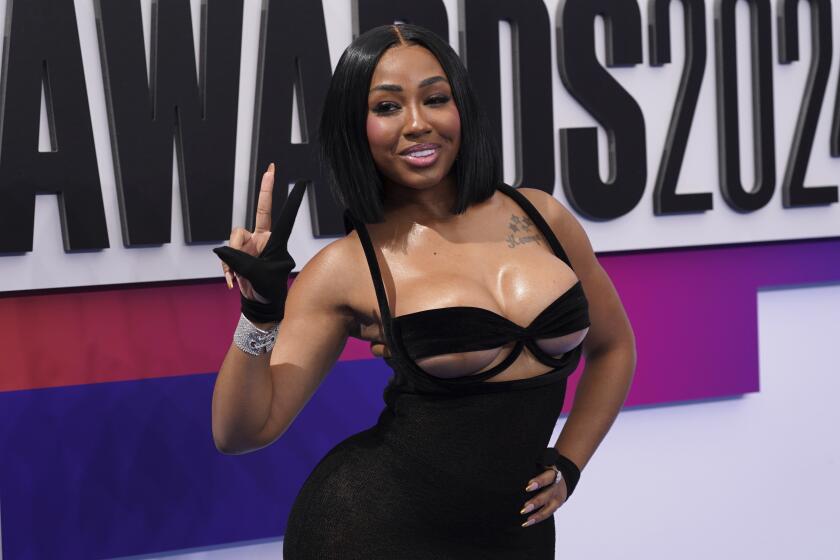‘Godfather of African Soul’ on U.S. Safari : Pop music: Cameroon’s Manu Dibango is on his first major tour here in years to promote ‘Wakafrika,’ which reinterprets Afro-pop songs, including his ‘Soul Makossa.’
One by one and in small groups, nearly a dozen admirers approached the small table at Ngone, a colorful Senegalese oasis in Lower Manhattan.
They all came to pay their respects to the Godfather.
Four men waved at him and smiled from a table across the room. Another man introduced himself and brought with him two young women who wore flowing yellow and green African print dresses and briefly sang for him. Even the restaurant’s maitre d’ playfully chided the Godfather for not staying long enough.
With his eyes hidden by tinted, golden-brown, horn-rimmed glasses, Manu Dibango--the 60-year-old Cameroonian saxophonist, bandleader and composer who is known to millions of Africans and Europeans as “the Godfather of African Soul”--cheerfully conversed with his fans. He spoke in a rich, raspy French, often throwing back his head and heartily laughing.
The tall, bald-headed singer--whose imposing appearance alone is enough to justify his nickname--is currently on his first major American tour in several years, promoting his latest album, “Wakafrika.”
“It’s a musical safari,” Dibango said of “Wakafrika,” between drags on a cigarette and sips of black coffee.
“It’s like a trip from Dakar to Cape Town,” he continued, pointing to a photograph on the back of his CD of a West African vehicle called a bush taxi. “I’m the driver. I picked up Salif Keita in Mali, Toure Kunda in Senegal, Angelique Kidjo in Benin and Ladysmith Black Mambazo in South Africa.”
Those and other African stars, including Youssou N’Dour and King Sunny Ade, are joined by European luminaries Peter Gabriel and Sinead O’Connor as guests on the album’s reinterpretations of a baker’s dozen of Afro-pop or African-influenced songs, including Dibango’s own 1973 breakthrough, “Soul Makossa.”
For Dibango and Senegalese producer George Acogny, “Wakafrika” was a dream project that took two years to complete.
“I thought, ‘Can we put together the most popular African artists and combine on one project?’ ” Dibango said. “I asked them if they liked the spirit of the record. I told them they must trust me and I would respect them. I heard the songs and I wanted to take them to new levels. You have to let your imagination travel.”
Like the nearly two dozen albums Dibango has recorded, the new “Wakafrika” combines diverse musical elements and Afrocentric themes. It follows an ideal that Dibango has pursued since he was a philosophy student in Paris in 1960, where he was swept up simultaneously by the spirit of African independence and by American jazz. Dibango said the album’s title speaks to the dream of pan-African unity in both music and politics.
“ Waka is a pidgin word in Cameroon which means wake up or walk ,” Dibango said. “It’s the notion of motion.”
The album’s rich and varying tapestries of African musical styles stem directly from “Soul Makossa.” But unless that tune’s chant mama-ko-mama-sa-mama-makossa jogs your memory, you may not remember it as the groundbreaking 1973 American pop hit.
The tune “was a bridge connecting America with the motherland in the early ‘70s, during the ‘black is beautiful’ period,” Dibango said.
That hit, from his debut album, “O bosso,” opened the door to Dibango’s 1973 shows at New York’s Yankee Stadium and Madison Square Garden, attended by nearly 100,000 fans in total.
After those shows, Dibango’s radio airplay waned in this country. But his polyrhythmic fusion of traditional West African melodies, jazz, classical, funk, reggae and hip-hop established him as a pop music icon in Africa and Europe for the past 21 years.
His weekly, hourlong French TV show, “Salut Manu,” showcased Dibango’s music and gave him the opportunity to introduce viewers to young African guest players, which further solidified his “Godfather” image.
“I’m always interested in what young musicians are doing,” Dibango said, adding with a laugh, “You need to get young blood, so in that way I was like a vampire.”
* Dibango plays a benefit for the St. Jude Children’s Research Hospital in Orange tonight, with Hugh Masekela and Angelique Kidjo, at the House of Blues, 8430 Sunset Blvd. 7:30 p.m. $30. (213) 650-1451. Dibango also plays Thursday at the Santa Monica Pier, 7:30 p.m. Free. (310) 458-8900.
More to Read
The biggest entertainment stories
Get our big stories about Hollywood, film, television, music, arts, culture and more right in your inbox as soon as they publish.
You may occasionally receive promotional content from the Los Angeles Times.










